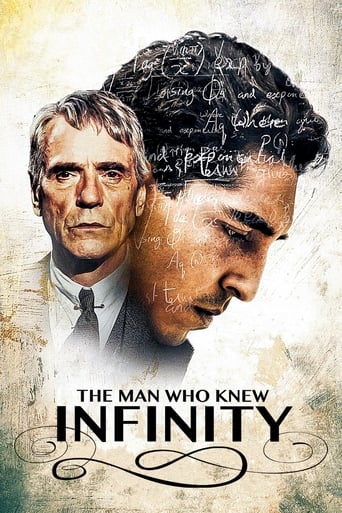

Dreadfully Boring
... View MoreExcellent characters with emotional depth. My wife, daughter and granddaughter all enjoyed it...and me, too! Very good movie! You won't be disappointed.
... View MoreWorth seeing just to witness how winsome it is.
... View MoreThis is a coming of age storyline that you've seen in one form or another for decades. It takes a truly unique voice to make yet another one worth watching.
... View MoreThe Man Who Knew Infinity - Although the scientist-as-superhero film genre is more than well-established by now through A Beautiful Mind, The Imitation Game and The Theory of Everything, This biopic of Srinivasa Ramanujan warrants a watch for the pure genius the leading man epitomized. A Fellow of the Royal Society and also Fellow of Trinity College - monumental attainments for an Indian with no formal training in mathematics - tips of the iceberg for the genius that Srinivasa Ramanujan was, the movie tries to capture his liaison with renowned mathematician G.H.Hardy and his life at the Cambridge university.The movie scores in its accurate rendering of the intellectual mathematics involved and the realities of academic antagonism; the historical and cultural skirmishes between Indian and English conducts and the side track of jingoists vs. pacifists. A Tamil movie with the same topic - Ramanujan was released one year earlier which dispensed more with the personal life and enlargement of the virtuoso.Having said that, Dev Patel was an out-and-out miscast for the role, given Ramanujan's short and stout physique and his Dravidian guises. Patel is sure a strange casting choice yet captures his appeal with integrity and passion and in some means, a heftier underdog akin to his breakout role in Slumdog Millionaire.Biopics in our country have apportioned mostly with sportsmen (Bhaag Milkha Bhaag, M.S.Dhoni, Mary Kom, Dangal, Paan Singh Tomar, Azhar) while undermining the scientists and intellectuals - it's a pity that we are still relishing on screen versions of delinquents like Gujarati Bootlegger Abdul Latif (Read Raees !) while the west is adapting our finer lives to silver screen !
... View MoreDev Patel is Srinivasa Ramanujan, the young man who is a mathematical genius and works his way up from one of the more culturally devalued areas of India, Madras, to a royal fellowship at Cambridge, under the tutelage of G. H. Hardy, and suffers an early death from tuberculosis.Early scenes shot in India establish his background -- poverty, a loving and beautiful wife, and a demanding and domineering mother. Patel can't keep his nose out of books. The solutions to complicated problems in math come to him unbidden, intuitively. As he later declares, they are put there by God. His entreaties to the august G. H. Hardy, Jeremy Irons, come as a surprise in the post. Patel's solutions are so good that Irons thinks some friend at Trinity College is playing a joke on him. But the letters are real enough, and Irons arranges for Patel's transport to Cambridge in the years before World War I, his future so bright that he has to wear shades. There, Patel is put up in a comfortable room but finds that he's served meat in the mess hall and he's a vegetarian. The necessary shoes are also a nuisance to feet that have never met a shoe. There is prejudice against the Wog. There is his family back in Madras where Ama, who never approved of the marriage, hides her son's letters to his wife and only pretends to mail hers to him. This may strike us as pretty nasty but mainly because we don't have the strong extended families that India had in 1913. Marriages were still arranged by families and wives knew their place in the household. Their job was to sit and fan the flies away while the husband ate, and then the wives got the leftovers. The tradition was called varna, with a retroflex "r". I mention all this only to suggest that the wife was not as powerful a figure as the mother.And now, if someone will just help me down from behind this lectern -- Thank you. See, the problem is that Patel's solutions come to him from God and Irons, his sponsor and mentor, is an atheist who doesn't believe in OUR god let alone a multitude of many-armed dancing figurines and reincarnation. ("Maybe you'll come back as a pigeon turd.") Irons won't be satisfied in Patel's solutions unless Patel can come up with proofs instead of epiphanies."Proof" in math, as I recall from high school geometry, goes a little like this. Somebody presents an argument that, let's say, at the very bottom of the ocean there are strong creatures adapted to the monumental pressure and the freezing temperatures and utter darkness. It's an elegant argument, showing how physiology can keep fish blood from freezing, how an organism may evolve to resist the pressure, and so forth. It makes sense. But the proof of the argument lies in catching one of those organisms.Patel's solutions are "jumpy and very wild," as a prof once described my theorizing in a sociology class. Irons demands the proofs. He has to, if they intend the work to be published without being ridiculed. It's a source of continuing conflict between them -- Patel and his god, and Irons and his proof. As you can see, the difficulty takes us beyond combinations and permutations into the realm of the unknowable. Of course, the two of them face a superordinate enemy. Except for a couple of fellow at Trinity, like Littlewood and Bertrand Russell, they are both bludgeoned by the staff. Irons has introduced Baboo here, and Patel himself is swarthy and uppity. In the end, the two have become close friends, although, in the usual manner of U-C Brits, Irons is unable to be very expressive about it.The performances are all pretty good. I'm happy that Patel was cast as Srinivasa Ramanujan because he's so unprepossessing, not particularly handsome and sporting a pair of big ears. At that, he's more presentable than the real Ramanujan. Irons is always a pleasure to watch, except maybe for that Die Hard feature in which he was forced to play a villain with a German accent.The narrative can't avoid some of the usual elements of the biographical movie. Every protagonist implies its antagonist. There must be demons to overcome otherwise what the hell kind of a movie are we talking about? The heroic figure -- math genius, athlete, politician, singer, dancer, or pop icon -- travels along a monotonic path to the top of the heap, gets there, and then STAYS there? So Ramanujan and Hardy must have their Fellows at Cambridge and one has in addition family troubles and tuberculosis. So the unavoidable elements are there, yes, but rather nicely handled. Nobody's head is wrenched off. I enjoyed it.
... View MoreI liked the combination of love,struggle,talent and success of a guy shown through the movie.It was motivating as well as emotional.Also it shows value of friendship,love,leader and critics. Overall the acting was also natural. I watched it twice which is rare in my case.I recommend this for those who want to achieve something but feel their luck do not support and those who feel they do not have resources.
... View More'THE MAN WHO KNEW INFINITY': Three Stars (Out of Five)A British biopic about a brilliant mathematician from India, named Srinivasa Ramanujan, who made history in mathematical theories, during World War I. The film stars Dev Patel, Jeremy Irons, Devika Bhise and Toby Jones. It was directed and written by Matthew Brown, and it's based on the book, of the same name, by Robert Kanigel. The movie performed decently in indie theaters, at the Box Office, and it's received mixed reviews from critics. I thought it was OK. The story begins at the turn of the twentieth century, when Srinivasa Ramanujan (Patel) was extremely poor, and still living in Madras, India. His exceptional mathematical skills became very useful to his employers there, who began using him for multiple accounting jobs. They later encouraged him to go to college. A well known mathematician, at Cambridge University, named G.H. Hardy (Patel), then heard about Srinivasa (and he became very impressed by what he heard), so he invited him to come study under him. Srinivasa took him up on the offer, while he also married his girlfriend (Bhise), and he later became a renowned expert in mathematical theories, thanks to Hardy's guidance. The movie is, how can I say this nicely, boring. I'm sure there's a very inspiring, and quite interesting, story that could have been told, but the filmmakers failed to do so. It's a shame too, because Patel and Irons are both really good actors. I'm sure they were both hoping they were working with a much better director, and screenwriter. I'm also sure the real Srinivasa Ramanujan, and G.H. Hardy, deserved a much better film adaptation of their story!Watch our movie review show 'MOVIE TALK' at: https://www.youtube.com/watch?v=1M9osPwjfbM
... View More